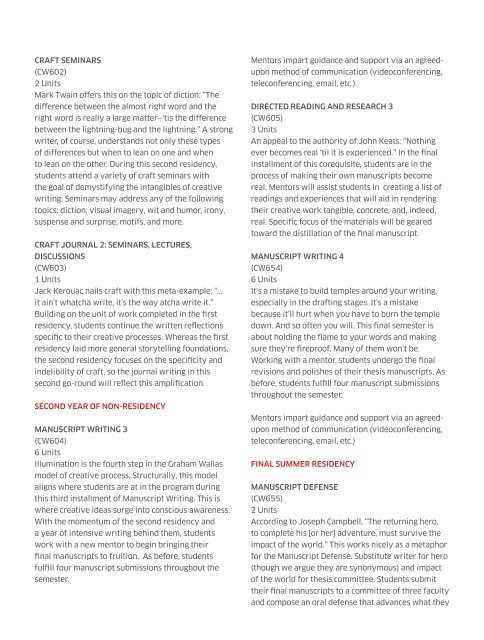LCAD-Catalog-2016-2018
You also want an ePaper? Increase the reach of your titles
YUMPU automatically turns print PDFs into web optimized ePapers that Google loves.
CRAFT SEMINARS<br />
(CW602)<br />
2 Units<br />
Mark Twain offers this on the topic of diction: “The<br />
difference between the almost right word and the<br />
right word is really a large matter—’tis the difference<br />
between the lightning-bug and the lightning.” A strong<br />
writer, of course, understands not only these types<br />
of differences but when to lean on one and when<br />
to lean on the other. During this second residency,<br />
students attend a variety of craft seminars with<br />
the goal of demystifying the intangibles of creative<br />
writing. Seminars may address any of the following<br />
topics: diction, visual imagery, wit and humor, irony,<br />
suspense and surprise, motifs, and more.<br />
CRAFT JOURNAL 2: SEMINARS, LECTURES,<br />
DISCUSSIONS<br />
(CW603)<br />
1 Units<br />
Jack Kerouac nails craft with this meta-example: “...<br />
it ain’t whatcha write, it’s the way atcha write it.”<br />
Building on the unit of work completed in the first<br />
residency, students continue the written reflections<br />
specific to their creative processes. Whereas the first<br />
residency laid more general storytelling foundations,<br />
the second residency focuses on the specificity and<br />
indelibility of craft, so the journal writing in this<br />
second go-round will reflect this amplification.<br />
SECOND YEAR OF NON-RESIDENCY<br />
MANUSCRIPT WRITING 3<br />
(CW604)<br />
6 Units<br />
Illumination is the fourth step in the Graham Wallas<br />
model of creative process. Structurally, this model<br />
aligns where students are at in the program during<br />
this third installment of Manuscript Writing. This is<br />
where creative ideas surge into conscious awareness.<br />
With the momentum of the second residency and<br />
a year of intensive writing behind them, students<br />
work with a new mentor to begin bringing their<br />
final manuscripts to fruition. As before, students<br />
fulfill four manuscript submissions throughout the<br />
semester.<br />
Mentors impart guidance and support via an agreedupon<br />
method of communication (videoconferencing,<br />
teleconferencing, email, etc.).<br />
DIRECTED READING AND RESEARCH 3<br />
(CW605)<br />
3 Units<br />
An appeal to the authority of John Keats: “Nothing<br />
ever becomes real ‘til it is experienced.” In the final<br />
installment of this corequisite, students are in the<br />
process of making their own manuscripts become<br />
real. Mentors will assist students in creating a list of<br />
readings and experiences that will aid in rendering<br />
their creative work tangible, concrete, and, indeed,<br />
real. Specific focus of the materials will be geared<br />
toward the distillation of the final manuscript.<br />
MANUSCRIPT WRITING 4<br />
(CW654)<br />
6 Units<br />
It’s a mistake to build temples around your writing,<br />
especially in the drafting stages. It’s a mistake<br />
because it’ll hurt when you have to burn the temple<br />
down. And so often you will. This final semester is<br />
about holding the flame to your words and making<br />
sure they’re fireproof. Many of them won’t be.<br />
Working with a mentor, students undergo the final<br />
revisions and polishes of their thesis manuscripts. As<br />
before, students fulfill four manuscript submissions<br />
throughout the semester.<br />
Mentors impart guidance and support via an agreedupon<br />
method of communication (videoconferencing,<br />
teleconferencing, email, etc.)<br />
FINAL SUMMER RESIDENCY<br />
MANUSCRIPT DEFENSE<br />
(CW655)<br />
2 Units<br />
According to Joseph Campbell, “The returning hero,<br />
to complete his [or her] adventure, must survive the<br />
impact of the world.” This works nicely as a metaphor<br />
for the Manuscript Defense. Substitute writer for hero<br />
(though we argue they are synonymous) and impact<br />
of the world for thesis committee. Students submit<br />
their final manuscripts to a committee of three faculty<br />
and compose an oral defense that advances what they<br />
have learned on their creative journeys. Students<br />
should expect to field questions specific to form,<br />
genre, and craft. Yes, it might be difficult, it might be<br />
intimidating, it might be rigorous, but shouldn’t it be?<br />
It is, after all, what separates those who are masters<br />
from those who are not.<br />
SELF-MARKETING<br />
(CW656)<br />
2 Units<br />
“If you’re going to be crazy,” says Hunter S.<br />
Thompson, “you have to get paid for it or else you’re<br />
going to be locked up.” If you’ve made it this far into<br />
the program, then you’re a writer; if you’re a writer,<br />
you’re probably a little bit crazy. But, ya know, the<br />
good kind of crazy. Taking the gonzo journalist to<br />
heart, then, this course — via lecture, discussion, and<br />
Q&A — prepares students to navigate the writingspecific<br />
terrain of self-promotion, marketing,<br />
collaboration, agents, managers, producers, and more.<br />
JOURNAL 3: SEMINARS, LECTURES, DISCUSSIONS<br />
(CW653)<br />
1 Units<br />
Plato, Socrates, Aeschylus, and a host of others have<br />
leaned pretty heavily on the following suggestion<br />
— “Know thyself.” It’s apt advice for anyone but<br />
especially for a writer. This final course asks students<br />
to reflect one last time on who they’ve become as<br />
a result of three residencies, four semesters, and<br />
thousands and thousands of words, written, read, and<br />
exchanged.<br />
CATALOG<br />
254


